Traditional coffee brewing method in the era of high-quality coffee, who would like to taste the most traditional cup of coffee?
When it comes to the word "coffee", many people will begin to discuss coffee brewing methods and coffee flavor. For coffee brewing methods that are not commonly used in modern times, they will adhere to the principle of "being too outstanding at a glance" and "what is there to discuss". In this era of boutique coffee, who wants to try the most traditional cup of coffee?
A simple stainless steel coffee pot, a cheap filter spoon, an old man in his twenties, guarding this 117-year-old traditional Thai cafe. Here, there are no boutique coffee beans, no hand-brewed coffee, no Italian coffee machine, no gorgeous decoration, all the items in the store tell everything about the past hundred years.
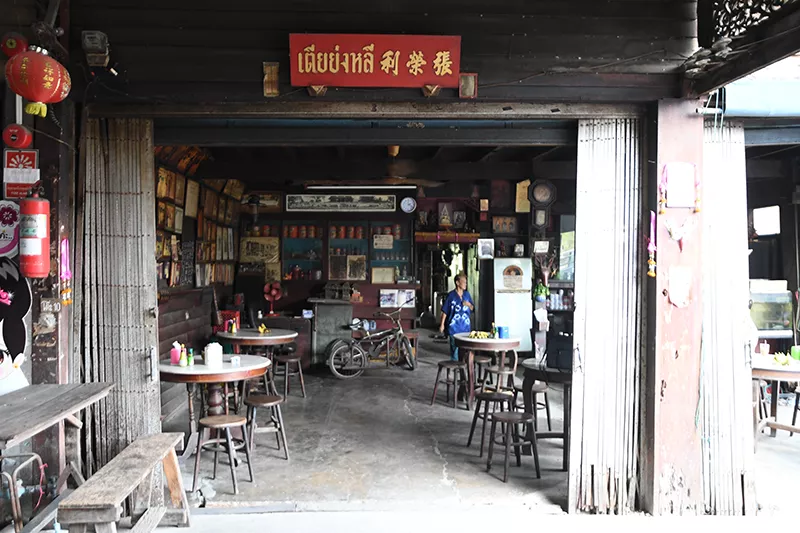
The century-old Siamese cafe, located in Baton Thani in northwestern Thailand, is called Zhang Lirong. The Guangdong Chaozhou dialect of "Lirong" means "full of good stories", and the founder of the store is a Chaozhou native who came to Siam to do business a hundred years ago.
According to the current shop owner A Nancha, his grandfather came to northwest Thailand around 1900. Grandpa started selling coffee beans in the canal market. after making money, he bought a property on the riverbank and started running the cafe in 1905. Anancha is the third generation to take over.
As it has left many generations of memories of local residents, it also makes many locals go to the water market and will definitely go to the store for a drink. A Nancha said that all the coffee beans used in the store are Robusta varieties from southern Thailand, and every morning he gets up early to prepare charcoal fire and then roast the coffee beans. The whole baking process often takes 30-50 minutes, during which the heat should be kept under control, ensuring that the coffee beans will not taste bitter while roasting deeply.
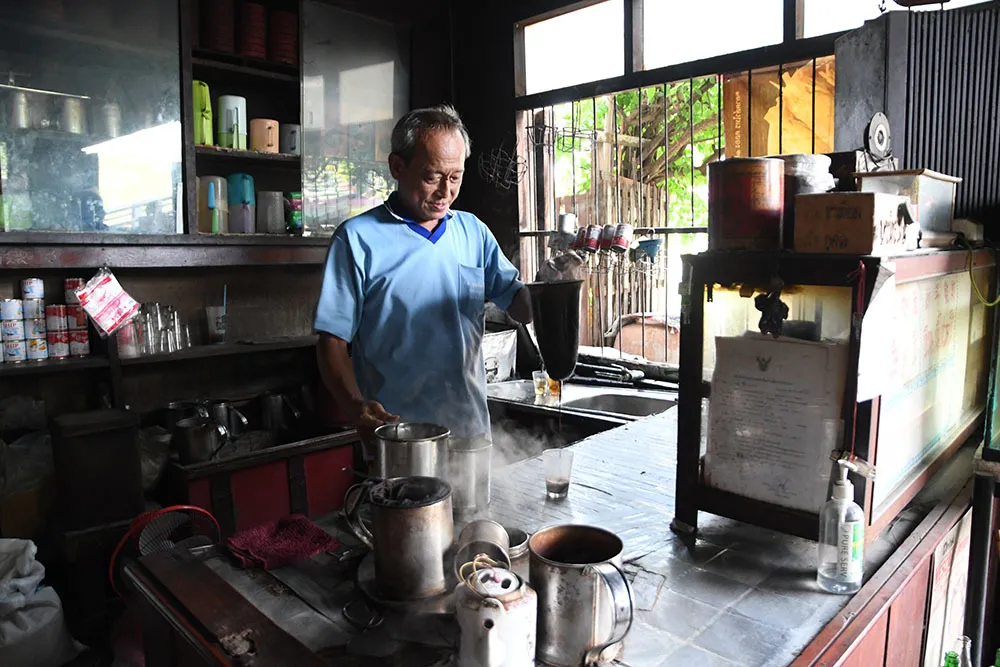
After roasting, the coffee beans are ground to the right thickness, then put into cans for storage, and then open the door to greet incoming guests. There are not many kinds of coffee in the shop, all of which are marked in Chaozhou dialect. For example, "suang kao double mouth" refers to a mixture of hot and cold coffee; "gao baht nine baht" (Thai baht reads "baht" locally) is a kind of coffee with red syrup; "O liang" is black coffee with ice cubes.
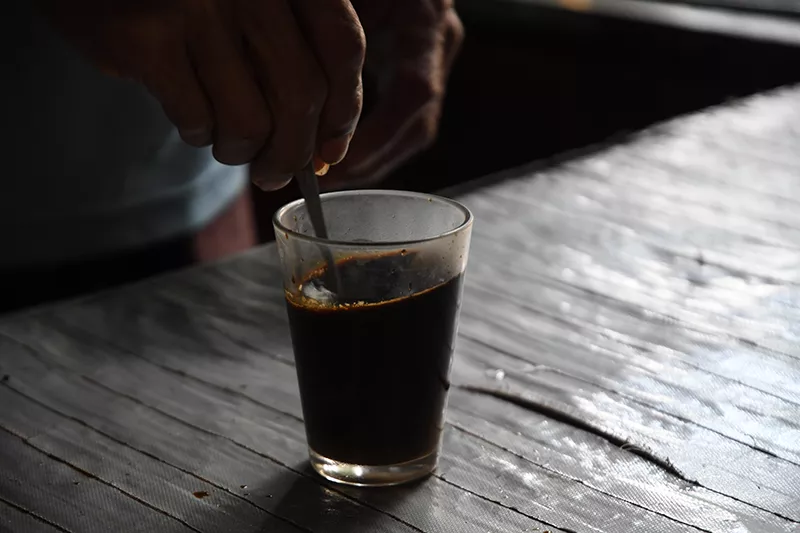
-kopi suang kao-
For the price, it is very cheap! All coffee is 10bath (1.9RMB) and takeout is 15bath (2.8RMB). The coffee shop persisted in this price both before and after the epidemic. A Nan Chao said that he did not intend to increase the price, because the income was enough for him to make a living, and the neighbors in the neighborhood were used to the price. For him, running a coffee shop is more about adhering to the heritage of the older generation and selling the most traditional Thai coffee for everyone.
As for the inheritance of this century-old cafe, A Nanca said that he did not have any plans. If the next generation is willing to inherit the family business, whether direct or non-direct, he will be happy to pass it on. But if the next generation thinks it's a burden, he won't force it, but he will keep running the cafe until he can't do it.
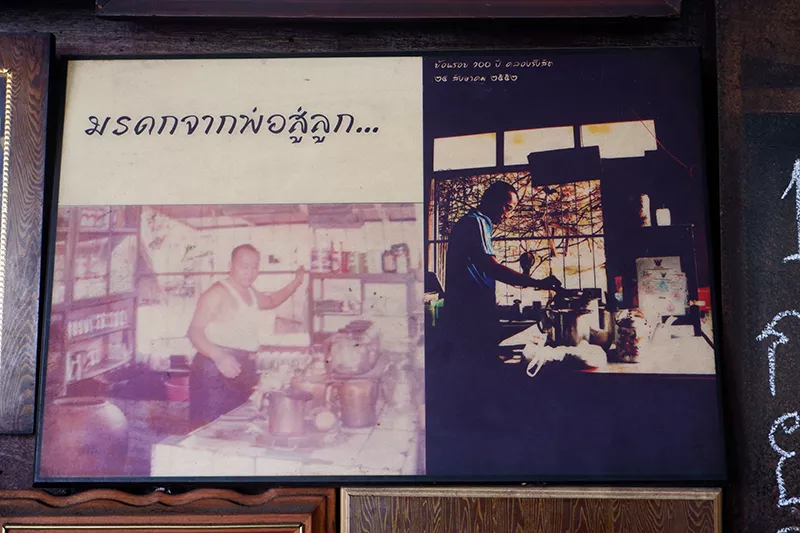
Everything in the coffee shop has its own story, and the photos on the wall tell the story of generations. The century-old tables and chairs, the century-old coffee stove, the century-old baking techniques and the century-old coffee brewing technology well reflect the Chinese people's most traditional "inheritance". Every seemingly ordinary cup of coffee speaks of the word "inheritance".
The shopkeeper is calm that it is not easy to run a century-old coffee shop. Before the popularity of the Internet, cafes were in the neighborhood business, and the enthusiasm of the neighborhood also allowed the cafe to weather the financial storm and other natural disasters, large and small. It wasn't until 2005 that the shopkeeper helped a group of hungry young people.
In order to thank the shopkeeper for his kindness, these young people promoted the century-old coffee shop through social networks, and soon more young people came to "clock in". Originally low-key cafes have spread throughout Thailand in a short period of time from northwest Thailand. At the same time, many foreign tourists have specially come to visit for a cup of the most traditional local Thai coffee, in order to feel the heritage of this culture.
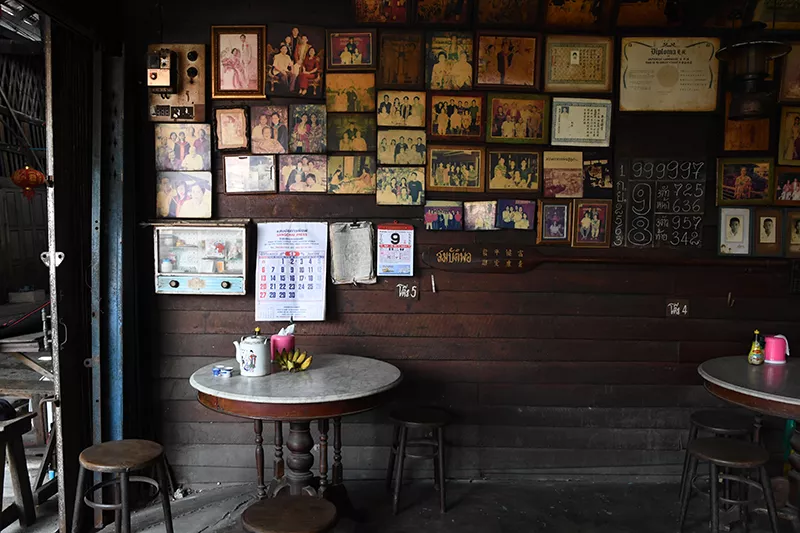
In addition to Thailand, there are many stores in Hong Kong, China that still retain the traditional coffee brewing method and coffee roasting technology. Charcoal roasted coffee, roasted coffee with spirits, stir-fried coffee in iron pot, etc., each store that insists on selling traditional coffee has its own unique understanding and technology of roasting coffee beans. There is no complicated brewing method, a filter, a pot, thus selling their own coffee for generations. It looks like a cup of black coffee, even with sugar and milk, you can drink it differently.
Perhaps a traditional cup of coffee will be "bitter to panic" and "exquisite" to everyone, but not many people have really tasted it or are willing to taste it.
Do not be constrained by some superficial things to explore coffee, the real interesting is often in these modern boutique coffee "gold cup extraction theory" and should have "on the baking curve" of traditional coffee.
Photo source: Internet Today Thailand
Professional coffee knowledge exchange more coffee bean information please follow the coffee workshop (Wechat official account cafe_style)
For more boutique coffee beans, please add private Qianjie coffee on Wechat. WeChat account: kaixinguoguo0925
Important Notice :
前街咖啡 FrontStreet Coffee has moved to new addredd:
FrontStreet Coffee Address: 315,Donghua East Road,GuangZhou
Tel:020 38364473
- Prev

How to run a coffee shop? Why can there be more and more coffee shops in Shanghai?
As we all know, the opening speed of Shanghai cafes is not as fast as Lamborghini. In this "choppy" city where the coffee industry is involved, more and more cafes are opened because it is really easy to run cafes. According to "Shanghai 202" issued by the Coffee Professional Committee of Shanghai Food Industry Association in November last year.
- Next

South Korea's popular wildlife coffee shop will be completely closed! How is the hygiene of the pet coffee shop?
According to South Korea's Seoul News, South Korea's Ministry of Environment announced on January 13 that in order to safeguard animal well-being (a principle for safeguarding all animals, including farm animals, laboratory animals, companion animals, work animals, recreational animals and wild animals), the display of wild animals outside zoos will be banned.
Related
- What grade does Jamaica Blue Mountain No. 1 coffee belong to and how to drink it better? What is the highest grade of Blue Mountain coffee for coffee aristocrats?
- What are the flavor characteristics of the world-famous coffee Blue Mountain No. 1 Golden Mantelin? What are the characteristics of deep-roasted bitter coffee?
- Can I make coffee a second time in an Italian hand-brewed mocha pot? Why can't coffee be brewed several times like tea leaves?
- Hand-brewed coffee flows with a knife and a tornado. How to brew it? What is the proportion of grinding water and water temperature divided into?
- What is the difference between Indonesian Sumatra Mantinin coffee and gold Mantinin? How to distinguish between real and fake golden Mantelin coffee?
- What does bypass mean in coffee? Why can hand-brewed coffee and water make it better?
- Unexpected! Ruixing Telunsu lattes use a smoothie machine to foam milk?!
- % Arabia's first store in Henan opens into the village?! Netizen: Thought it was P's
- Does an authentic standard mocha coffee recipe use chocolate sauce or powder? Mocha Latte/Dirty Coffee/Salty Mocha Coffee Recipe Share!
- What is the difference between Vietnam egg coffee and Norway egg coffee? Hand-brewed single product coffee filter paper filter cloth filter flat solution!

